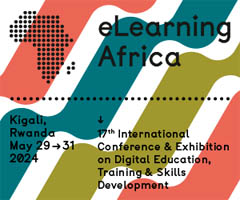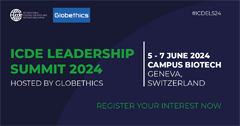OEB Global 2023 - a Wrap-Up
Berlin (GER), December 2023 - On 22-24 November, the digital-learning community came together in the heart of Berlin for the 29th edition of the OEB Global Conference. Thousands of learning professionals from over 70 countries worldwide celebrated digital learning in the education, corporate, and civil learning sectors.
The InterContinental Berlin hotel saw three days of pre-conference workshops, keynote plenaries, innovative debates, and thoughtful discussions. An illustrious assembly of over 200 speakers delivered more than 100 interactive, dynamic sessions. Among the highlights included the "Learning Battle", the powerful opening plenary, the always highly anticipated annual debate, and the final keynotes on Friday, each dedicated to the higher education and L&D sectors.
This year, OEB hosted seventeen pre-conference workshops to set the tone for the two days that followed. Participants were invited to engage in these workshops, focused on reshaping pedagogical approaches in the digital age. Educators and instructional designers explored cutting-edge strategies to engage learners and enhance the overall learning experience.
To kick off, the thirteenth edition of the Speexx Exchange, "The Event for Curious HR and L&D Minds - Humanizing Work in an AI World" brought the annual reality check on the state of digital corporate learning and coaching. It was a hybrid session, bringing participants together online as well as in person to explore the interplay between human work and AI, sharing valuable insights on how to position, harness, and utilise technology to bring out the best in people with AI. Other workshops included "The Blended Learning Design Game", "The Art of Crafting Educational Videos", and "Learning in an Immersive Online Multiplayer 3D/VR Environment". All of this year's pre-conference workshops provided an open, interactive space to build practical skills and get ready for the main conference…
After a hands-on day of thought-provoking workshops, OEB participants were invited to join the learning arena run by Inge de Waard, Learning Innovation Coordinator at InnoEnergy and OEB23 keynote speaker. Participants were encouraged to come on stage and share what new learning or teaching idea they are working on by speaking for three minutes on stage. After their brief pitch, the audience asked questions to test the presenter in an amicable way. Following this, the audience voted by means of applause. After all the pitches, the person with the loudest applause won the Learning Battle Cup!
This year's winner was Maria Hutchinson, OEB23 speaker and Senior Lecturer in Learning Design at the University of Portsmouth. She shared the great work they are doing at the University of Portsmouth with "enABLe", the university's framework to support innovative team-based learning design.
The Opening Plenary was chaired by Donald H Taylor and featured keynotes Helen Lee Bouygues, Professor Luciano Floridi, and Eric Sheninger. Helen is Founder & President at Reboot Foundation and emphasised "Critical Thinking in the Data Revolution", shedding light on the imperative of discerning truth in a data-saturated world. Luciano is Professor of Cognitive Science and Founding Director of the Digital Ethics Centre at Yale University. He expertly delved into "Living in the Infosphere", exploring the profound implications of a hyper-connected reality on education, ethics, and human equity. Eric is CEO of Aspire Change EDU and in the plenary encouraged educators for "Disruptive Thinking" pedagogy, urging educators to foster resilient learners capable of navigating an unpredictable digital landscape.
The OEB Annual Debate is a treasured aspect of the conference, and this year the challenge was "This House Believes that the Widespread Implementation of AI in Learning Will Do More Harm than Good". Our debate speakers this year were Inge de Waard, Donald Clark, Tim Unwin, and Beth Havinga. Moderated by Maximilian Jarrett, the debate delved into whether the widespread integration of AI in education could, in fact, yield more harm than good, prompting a critical examination of potential drawbacks outweighing the benefits, whilst taking into account various dimensions, including ethical concerns, societal implications, the human touch in learning, as well as the risks of plagiarism and the potential downsides of AI-driven assessment methods.
In the end, the debate ruled against the motion.
The final day opened with two plenaries: "The Big Reset: Adapting to a New Educational Landscape", focusing on the higher education space moderated by Gilly Salmon, and "It's L&D's Moment - But Are We Ready?" for the corporate learning world, moderated by Donald H Taylor.
Brent Anders, Margaret Korosec, and Sian Bayne delivered the thought-provoking plenary delving into the transformative impact of emerging technology on the education landscape. In our ever-evolving technological landscape, recent advancements, especially in conversational and generative AI, are on the brink of catalysing a profound transformation in the realm of education and student assessment. These developments challenge the traditional educational paradigm, shifting the spotlight from educators to learners. The question arises as to whether can we do anything other than wholeheartedly embrace these changes. The keynotes discussed what sets us apart from machines and charted a course towards a re-imagined future for education.
Donald H Taylor was joined by Simon Brown to share how businesses are more focused than ever on skills and performance, and realising the value of people. A question that was debated and explore in-depth was whether businesses understand L&D's role in creating a future-ready workforce. Our speakers demonstrated how L&D can make the most of this moment - from building a culture of learning to working closely with executives and managers to hard-wire organisational capability into an organisation.
On the Friday afternoon, Gilly Salmon, CEO at Education Alchemists, delivered a session on "Shaping Education and Policy - The Closing Café: Making Your Mark on The Futures We Choose". This was a dynamic, interactive closing session that illuminated the path to innovative future thinking. During this engaging workshop, OEB participants discovered a quadrant framework for innovation that resonates with their unique work and context. Participants went on to forge new links and think differently about possible futures - collaborating on potential future contexts and to bring them to the present.
As the OEB Global Conference came to a close, participants were left with a powerful closing conversation wrapping up the main theme of 2023: The Learning Futures We Choose. This session was delivered by Laura Overton, an Analyst, Explorer, Writer, and Facilitator at Learning Changemakers. This moment of reflection featured Laura gathering participants to pause, share insights, and consider the strides we'll take next. This concluded the Conference and treated participants to a fun and reflective conversation before everyone departed - not just home, but to catalyse change in the digital learning world.
- YouTube https://youtu.be/n3YldZ5vw0Q









